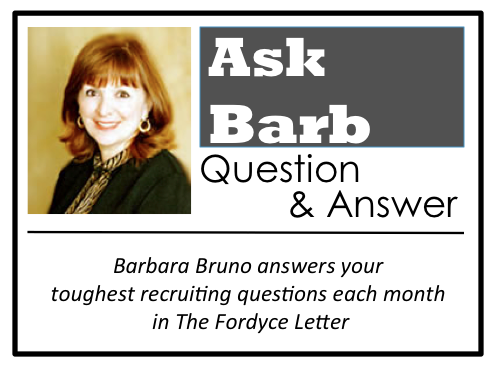Dear Barb:
Last year I talked to you at the Fordyce Forum and when I explained my issues to you, you had suggested that I improve the prep I was conducting, with both my candidates and clients. I’ve tried to do that but candidates don’t call me to get prepped and my clients don’t think they need to be prepped.
How do you force people to do something that is good for them, but they just don’t realize it. Also, when I was prepping a guy the other day, he gave a really stupid reason for leaving a job. When I told him not to say that, he got upset with me. He felt the new employer should know the truth and if they didn’t like it than maybe this isn’t the right company for him.
I liked your advice, but I’m having a tough time getting cooperation here.
Kathy M., Dallas, TX
Barb Responds
Dear Kathy:
You don’t want to use the word prep with either your candidates or clients. They must understand the benefit to them, if they are going to give you their valuable time. To get their cooperation, you need to change your approach. You can’t force anyone to do something they don’t want to do. I don’t believe in client or candidate control. A more effective approach is to develop candidate rapport based on trust.
When you call to arrange your prep, you should say the following:
CANDIDATE
“I have some inside information that can help you outshine your competition in the interview. When can we set time aside where you can talk openly?”
Remember the second part of the prep is to role play with the candidate.
CLIENT
“I would like to share the hot buttons of the candidate you are scheduled to interview. This will provide you with a competitive edge over other opportunities they are considering if you decide to pursue this individual. When is it most convenient for us to talk, this will only take a few minutes.”
Now let’s address the issue of your candidate getting upset when you tried to change his answer. Think for a moment about what you did. In essence, he felt you wanted him to lie, which is why he got upset. Whenever you are role playing during your prep and hear an inappropriate or harmful answer, switch places with the candidate:
“I’m going to be you for a moment and you are now my client. I want you to ask me the same question.”
You then repeat their answer and ask how the answer sounded. Almost 100% of the time, they will hear why their answer was inappropriate and come up with an alternative answer. If you change the answer, the candidate feels you are asking them to lie. If they change the answer there is no ramification and they will interview more effectively.
Barbara J. Bruno, CPC, CTS
